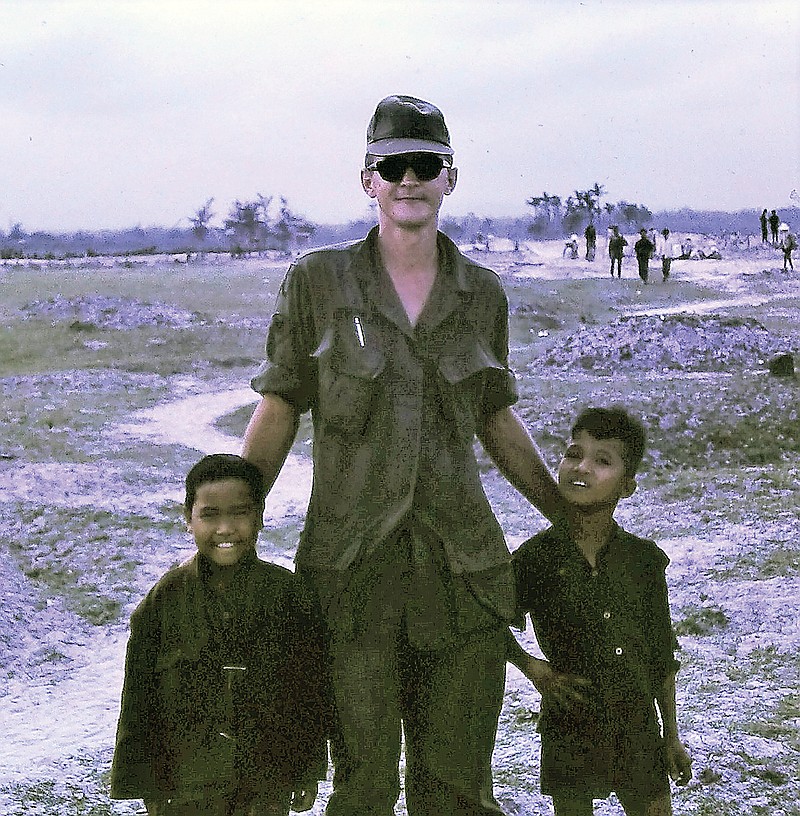Editor's note: This article is the final in a four-part series highlighting the life and Vietnam War experiences of the late Roger Buchta.
In the early weeks of April 1968, the peace talks that again began to weave their way into the newsfeeds in the United States became a point of discussion for Roger Buchta and his fellow combat medics serving at a U.S. Army field hospital on a military base in Quang Tri, South Vietnam.
As noted in his letters to family in Lohman, Buchta and his fellow soldiers dismissed the talks as utter foolishness, believing they would continue to treat combat wounded while also having the unenviable responsibility of preparing some of the less fortunate for body bags.
"It's Easter here in Quang Tri. Surprisingly, it has seemed like Easter - just in a different way," wrote Buchta on March 31, 1968. "It worked out that I was off today, so I guess I was fortunate in that respect. This morning some of us went to church. Services are held in a tent. Every seat was taken."
Three weeks later, his letters began to advise his parents the medical staff at the 18th Surgical Hospital was finally able to enjoy a welcome respite in the number of casualties being treated.
"Things have really quieted down in this part of Vietnam," explained his letter dated April 19, 1968. "Operation Pegasus, comprising elements of the 1st Cavalry and Marines was designed to pacify the area around Khe Sanh. It was supposed to be one of the major operations of the war."
He added, "As soon as the 1st Cavalry started sweeping around Khe Sanh and east to the Laotian border, the NVA (North Vietnamese Army) pulled out. The major objective of the drive has been met, namely to pacify the whole area south of the DMZ. We are receiving very few casualties as the result of hostile action "
Many of the routine tasks Buchta performed involved administering shots, taking vital signs for the doctors and documenting the results in the patient's medical records. Other times, when the hospital became overwhelmed because of combat casualties, he processed the remains of those killed in action, placing them in body bags to be shipped back to the United States.
The ebb and flow of casualties received at the hospital helped the time pass quickly. In June 1968, a letter Buchta sent home described to his family one of several unique medical processes he witnessed while serving overseas.
On June 16, 1968, he wrote, "A couple of nights ago Marines brought in a woman, her mother and a small child only six months old who was suffering from pneumonia and was just about dead. The woman and her mother were crying. The woman was certain the baby was going to die."
Buchta continued, "The doctor prescribed a mixture of IV (intravenous) fluids and drugs, which we immediately mixed up. Unable to find a vein in the child's arms or legs through which the fluids and drugs could be administered, the doctor had to give the fluids through a vein on the side of the baby's head."
As the former U.S. Army medic explained, a couple of days later the baby was well on its way to a full recovery and was transferred to a local Vietnamese hospital.
Two weeks later, in early July, Buchta was granted R&R (Rest and Recuperation) from his duties and had the opportunity to spend 10 days visiting historical sites in Taipei, the capital of Taiwan.
Shortly after returning to his duties at Quang Tri, he was relaxing in his cot while reading a book when a rocket struck outside of his tent, throwing him into a bookcase and injuring his nose and jaw.
"A few years after the war, Roger went to the VA in Columbia and had surgery to repair his nose and ended up getting a dental plate as well because of the teeth he lost in the incident," said his older brother, Don Buchta.
September 10, 1968, was the date of the final letter that the medical specialist sent home from Quang Tri before his departure from Vietnam. In it, he revealed he was recently promoted to the rank of specialist fifth class. Several days later, when processing out of the Army at Da Nang, he was offered a promotion to staff sergeant.
He declined the offer and was soon boarding a plane in Da Nang to return to the United States. Upon his arrival in state of Washington, he received his discharge at Fort Lewis on Oct. 6, 1968.
When arriving back in Lohman, he took a few weeks off before enrolling in graduate school at Lincoln University. He would go on to graduate with his master's degree in the summer of 1971. The following year, he was hired at Russellville High School and spent 27 years teaching such courses as German, world history, economics and sociology.
After retiring in 1999, he essentially became a hermit, staying home to pursue hobbies including woodworking and writing. On Feb. 5, 2019, he died in his home and was laid to rest several days later in the cemetery of St. John's Lutheran Church in Lohman.
Don Buchta said his younger brother was not the type to voluntarily share stories of the horrors he witnessed during his service, only speaking of it on rare occasion in the company of close friends and fellow veterans.
"He was very unique and his life is a collection of fascinating stories that includes his time in Vietnam and being present during the Tet Offensive," Don Buchta said.
With a notable pause, he added, "I have attended four different colleges and universities in my life and had some great instructors, but I can assure you that not one of them was as intelligent nor had the range of real-life experiences that he did."
Jeremy P. Amick writes on behalf of the Silver Star Families of America.

